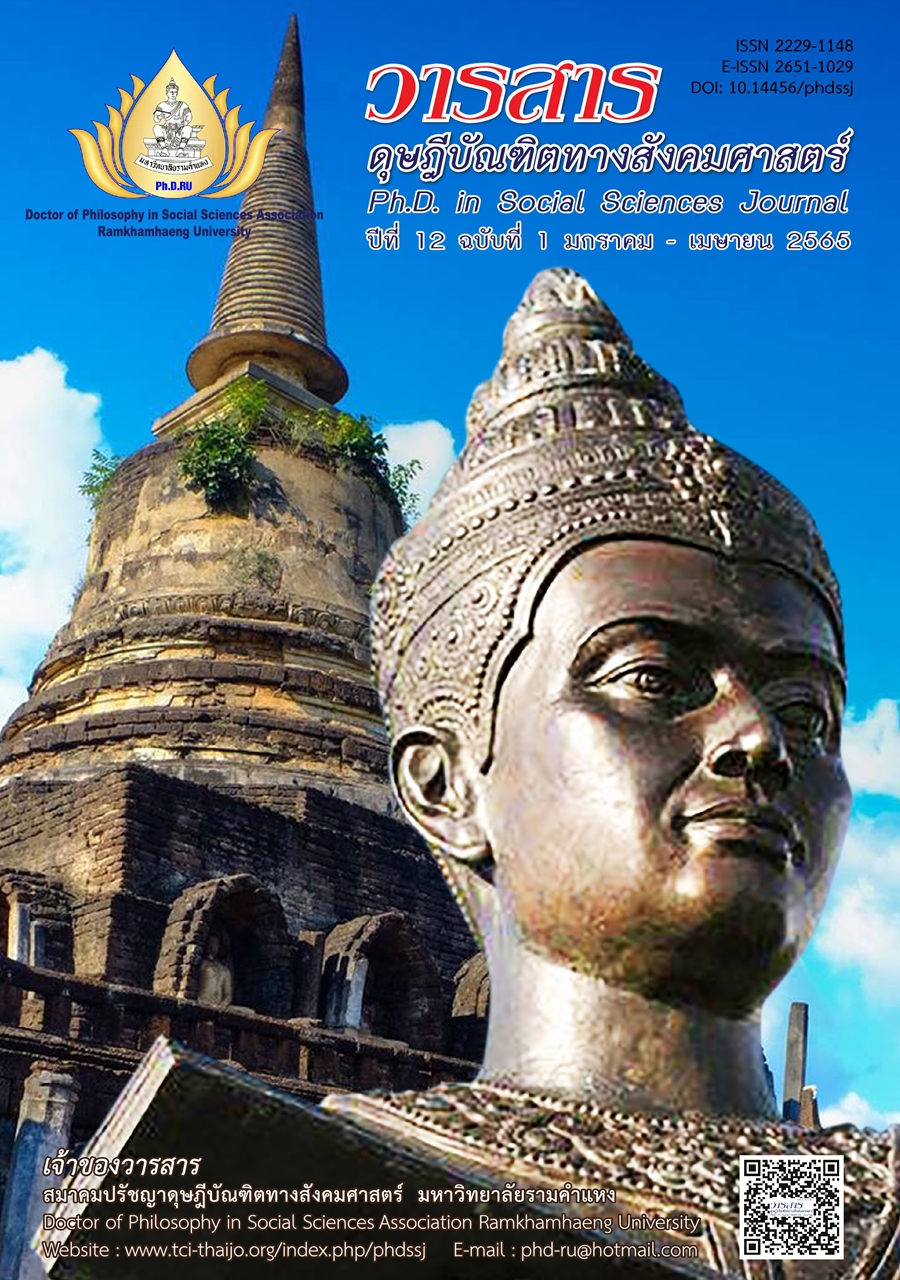Factors Influencing the Political Participation of the Elderly in the Bangkok Metropolitan Region
Main Article Content
Abstract
The objectives of this research are as follows: (1) the level of the promoting factors from government’s policies, personal factors, and the environmental factors; and (2) the promoting factors, personal factors, and the environmental factors influencing the political participation of the Thai elderlies. In this quantitative research investigation, The techniques of multistage random sampling and purposive sampling were used to obtain 600 subjects. A questionnaire was used as a research instrument. Data were analyzed using percentage, mean, and standard deviation. The techniques of exploratory factor analysis and path analysis were also employed.
Findings are as follows: (1) The political participation of the elderlies under study exhibited the mean at a moderate level. The highest proportion exhibited political participation at a primary level with the mean at a moderate level. The political participation at a high level exhibited the mean at a low level. Personal factors affected political participation, the promoting factors from the government’s policies and the environmental factors with the mean at a high level respectively (2) The promoting factors from the government’s policies exhibited a direct effect on political participation was 0.257. The indirect effect was through personal factors and the environmental factors with the effect size of 0.135. The total effect was 0.392. The environmental effect exhibited a direct effect on political participation was 0.452. The indirect effect through personal factors was -0.114. The total effect was 0.338. Personal factors exhibited only a direct effect on political participation was -0.191. There was no indirect effect.
Article Details

This work is licensed under a Creative Commons Attribution-NonCommercial-NoDerivatives 4.0 International License.
Academic articles, research articles, and book reviews in the Ph.D. in Social Sciences Journal are author’s opinions, and not the publisher’s, and is not the responsibility of the Ph.D. in Social Sciences Journal Philosophy Association, Ramkhamhaeng University. (In the case that research is done on human, the researcher has to be trained in Ethics for Doing Research on Human Training and has to produce the evidence of the training).
References
Boarini, R., & Díaz, M. (2015). Cast a ballot or protest in the street-did our grandparents do more of both?: An age-period-cohort analysis in political participation. Organization for Economic Cooperation and Development (OECD), 2(4-5), 7-43.
Bromage, A. W. (1954). Introduction to municipal government and administration. Appleton-Century.
Burikun, T. (2009). Political participation for Thai citizens in a democratic system from the fi rst constitution to the constitution of B.E. 2550. King Prajadhipok’s Institute. [In Thai]
Comrey, A., & Lee, H. (1992). A fi rst course in factor analysis. Erlbaum.
Constitution of the Kingdom of Thailand (Interim), B.E. 2557. (2014). Royal Thai Government Gazette, 131(55 A), 3-8. [In Thai]
Creighton, J. L. (2005).The public participation handbook: Making better decisions through citizen involvement. Jossey-Bass.
Huntington, S. P., & Nelson, J. M. (1982). No easy choice: Political participation in developing countries. Harvard University Press.
Khantikul, P. (2010). A political participation model of the people in Dusit district, Bangkok. The Institute of Research and Development, Suan Sunandha Rajabhat University. [In Thai]
McClosky, H. (1968). Political participation, international encyclopedia of the social science. The Free Press.
Melo, D., & Stockemer, D. (2014). Age and political participation in Germany, France and the UK: A comparative analysis. Comparative European Politics, 12(1), 33-53.
Milbrath, L. (1965). Political participation: How and why do people get involved in politics?. Rand McNally.
Milbrath, L., & Goel, M. (1997). Political participation: How and why do people get involved in politics?. Rand McNally.
Ministry of Social Development and Human Security. (2010). National Plan for the Elderly, Vol. 1 (B.E. 2545-2564), Revised Edition, No. 1, B. E. 2552. Author. [In Thai]
National Reform Steering Assembly. (2017). Thai constitution. Author. [In Thai]
National Statistical Offi ce. (2014). 2014 Survey of the elderly population in Thailand. Author. [In Thai]
Nie, N. H., & Verba, S. (1975). Political participation. In F. I. Grunstiien & W. P. Nelson (Eds.), Handbook political science: Non-government politic (pp. 9-12). Addisen Wesley.
Organic Law on Election of Members of the House of Representatives and Selection of Members of the Senate of B.E. 2550. (2007). Royal Thai Government Gazette, 124(64 A), 69-121. [In Thai]
Organic Law on Referendum of B.E. 2552. (2009). Royal Thai Government Gazette, 126(98 A), 1-17. [In Thai]
Raksakaew, R. (2016). Public participation. Retrieved from http://wiki.kpi.ac.th/index.php?title=การมีส่วนร่วมของประชาชน [In Thai]
Raphael, M. (2015). How older people will vote in the 2015 general election: A review of existing polling evidence. Quality in Ageing and Older Adults, 16(1), 65-68.
Rattanasanwong, K. (2016). Factors affecting to democratic people participation. Sripatum University. [In Thai]
Secretariat of the House of Representatives. (2011). Political participation of citizens. Author. [In Thai]
Sribuaiam, K. (2002). Constitution of the Kingdom of Thailand B.E. 2540: Problems, obstacles, and solutions. King Prajadhipok’s Institute. [In Thai]
Srimahawaro, W. (2011). Thai politics, systems or people: Cultural development and political participation of the people. Retrieved from http://wiki.kpi.ac.th/index.php?title=การเมืองไทยระบบหรือคน_%3A_การพัฒนาวัฒนธรรมและการมีส่วนร่วมทางการเมืองของประชาชน [In Thai]
Verba, S., Nie, N. H., & Kim, J. (1978). Participation and political equality: A seven nation comparison. University of Chicago Press.
Weiner, M. (1971). Political participation: Crisis of an sequences in political development. Princeton University Press.


